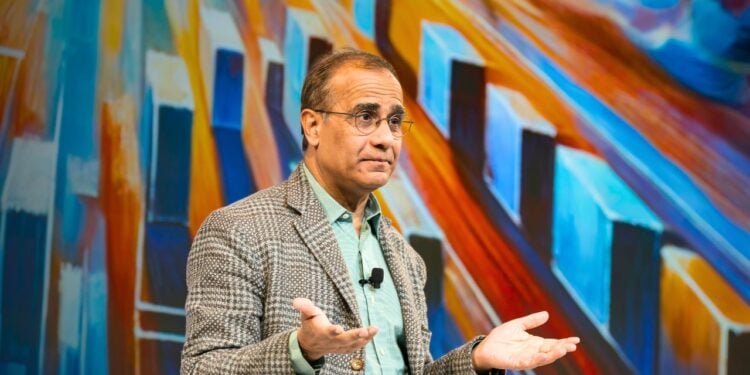- AI and automation are pushing work into a new era, where talent craves flexibility and purpose.
- Early adopters of new tech will lead, while those who wait risk falling into irrelevance.
- The future of work demands adaptable environments, where innovation thrives beyond the 9-to-5.
The future of work isn’t just about where we work, or even the tools we use to work — it’s about how we think about work itself.
Few people understand this shift better than Rishad Tobaccowala, Chief Growth Officer at Publicis Groupe and a veteran strategist in advertising, marketing, and business transformation.
On the latest episode of The Allwork.Space Future of Work® Podcast, Rishad lays out a powerful framework for understanding where work is headed.
He argues that three forces — technology, talent, and society — are shaping the next era of work, and that the relationship between technology and talent, in particular, is driving rapid change.
So, what does this mean for businesses and workers alike? It means that success will belong to those who embrace this transformation early.
In our conversation, Rishad breaks down how companies can adapt, why AI is more disruptive than we realize, and why flexible work is no longer optional — it’s essential.
Tech + Talent = The Future
Rishad says that right now, the real action is happening at the intersection of tech and talent.
They’re not just parallel tracks — they’re intertwined. Technology is making talent more powerful, and talent is using technology to push things even further. It’s like one big feedback loop, where each side is helping the other to grow and innovate.
So, what’s driving the direction of this growth? Rishad breaks it down into three main factors:
- Technology: Tech has always been a big player in how work gets done. But today, it’s not just about tools. It’s about AI, automation, and the whole new way we’ll be working in the years to come.
- Talent: What employees want from work is changing fast. There’s a whole new mindset, one that demands more flexibility, more involvement, and a sense of purpose. This shift is impossible to ignore.
- Society: Society itself plays a massive role in how work is viewed. For a long time, we defined work as a 9-to-5, punch-the-clock routine. But as culture and expectations shift, we’re starting to see that work means different things to different people. What’s “normal” today won’t be the norm tomorrow.
The Three Groups: Early Movers, Middle, and the Latecomers
While technology and growth are tied to talent, the degree with which talent is excited about technology varies widely.
Rishad compares the adoption of new technologies to a three-part timeline: the early movers, the middle group, and the latecomers.
- The Early Movers: These are the people or companies that jump in headfirst when a new technology drops. They get the rewards — big time. They can create brands, dominate markets, and ride the tech wave to major success. But there’s also a risk here. If they move too soon and the tech flops, they could be left with nothing.
- The Middle Group: These folks don’t go in right away, but they’re not lagging behind either. They wait for the tech to prove itself, and when it does, they come on board. They get the benefits, but they miss out on the huge financial gains the early movers often enjoy.
- The Latecomers: And then, of course, there’s the group that waits until there’s no choice. Think about the pandemic: businesses that held out on remote work were forced to adapt. The same thing happened with e-commerce; these people don’t jump into new tech until it’s absolutely unavoidable.
In some cases, like with mobile phones, the “latecomers” are pretty much non-existent. But with things like AI, Rishad says, the adoption curve will be more dramatic.
AI Isn’t Just Overhyped — It’s a Game-Changer
Rishad doesn’t just think AI is overhyped, he believes it’s massively underappreciated — and for good reason. But Rishad isn’t just talking about improving workflow, boosting productivity, or making tasks easier.
AI has the potential to make knowledge free, and that’s going to change everything.
AI is going to make it so much easier for people to access the information and skills that were once locked behind expensive paywalls or years of experience.
AI is going to make it so much easier for people to access the information and skills that were once locked behind expensive paywalls or years of experience. For knowledge workers, especially those in white-collar jobs, this is huge.
The countries leading the charge on AI are China and the U.S, as they have the resources and data to push things forward. But, interestingly, Rishad says AI could end up being a tool for smaller players to catch up fast.
Think about India — where high-speed internet is already cheaper than anywhere else in the world. AI could be the great equalizer, letting people in places with fewer resources leapfrog into the future of work.
The “Middle” Is the Worst Place to Be
Yet leapfrogging into the future is only possible when you’re prepared for it. Rishad firmly believes that being in the middle is the worst place to be when it comes to tech adoption.
It’s a dangerous spot to occupy, especially in a world where rapid changes are happening.
The early adopters get the financial and brand benefits, and the latecomers get dragged along out of necessity. But the middle group? They risk missing out entirely.
What’s interesting is that the power of AI might make this gap even bigger. Those who jump on the AI train early will have an edge, and those who wait will fall farther behind.
And while we’ve seen technological advances become more inclusive over time, it’s clear that AI won’t be a level playing field for long. Those who get ahead early will hold the keys to the future of work.
Flexible Work is Not Just a Trend, But a Necessity
Getting ahead early also requires not getting mired in the past.
While many companies are pushing for employees to come back to the office five days a week, Rishad thinks that approach is outdated.
He’s a strong advocate for flexibility in workspaces, noting that with so many options available — from coworking spaces to flexible offices — there’s no reason to require employees to be in a fixed office five days a week.
“I don’t understand why you have to get people five days a week to this one space,” he says. “There’s a lot of third workplaces… it’s not the office, it’s in-person interaction. You can make that happen in lots of places, including flexible spaces,” he said during the podcast conversation.
Rishad is not against in-person interaction, especially for younger employees or teams that need that face-to-face connection. But he argues that companies should rethink how and where that interaction happens.
After all, if you were designing a company from scratch today, would you insist on bringing everyone to the office every day?
In other words, today’s companies, especially those in the tech space, are starting with a blank page and none of the old, rigid structures. They’re able to build more flexible, agile work cultures.
Rishad’s point is clear: if you claim to be agile, but you’re also insisting on rigid office structures, something doesn’t add up. Flexibility and agility go hand-in-hand.
Leadership Is the Real Crisis, Not the Space
Enabling flexibility and agility comes down to forward-thinking leadership. Rishad has a warning for leaders who fail to adapt to the changing work environment and follow outdated, top-down leadership models.
“We’ve entered an age of debossification,” Rishad says. “[People] are no longer going to say just because you’re senior and say ‘This is the way.’ that’s what we’ll do. This is not the Mandalorian.”
He’s calling out those leaders who continue to cling to the old ways of doing things without recognizing that today’s workers demand something different — flexibility, purpose, and growth. The days of simply managing people through authority and control are fading fast.
For Rishad, leadership today is about earning trust and inspiring growth, not about micromanaging or maintaining the status quo.
It’s clear that the biggest crisis companies face right now isn’t one of physical space; it’s leadership that fails to adapt to the modern workforce’s needs.
The biggest crisis companies face right now isn’t one of physical space; it’s leadership that fails to adapt to the modern workforce’s needs.
A New Era of Expertise and Growth
One of the most compelling parts of Rishad’s discussion revolves around how new technologies are disrupting traditional industries, particularly consulting and law firms.
These businesses have long relied on veteran professionals with years of experience to provide expertise, but today’s generative AI tools like ChatGPT are changing the game.
Rishad explains that with AI and other tech tools, younger workers no longer need to wait 10 years to get the expertise required to rise through the ranks. Instead, they can access the information they need almost immediately, shortening their path to success.
“What you did is you spent the first 10, 12 years of your career learning about case studies, precedents, and how to utilize them. All of that is now ChatGPT,” Rishad says.
This is putting pressure on industries that once prided themselves on the slow, methodical accumulation of knowledge. The rise of new tech is forcing companies to rethink how they hire, train, and promote their employees.
It’s clear that in the future of work, speed, flexibility, and leadership will be the key factors that determine success.
Leaders who can embrace these changes without hesitation will be the ones who come out on top.



 Dr. Gleb Tsipursky – The Office Whisperer
Dr. Gleb Tsipursky – The Office Whisperer Nirit Cohen – WorkFutures
Nirit Cohen – WorkFutures Angela Howard – Culture Expert
Angela Howard – Culture Expert Drew Jones – Design & Innovation
Drew Jones – Design & Innovation Jonathan Price – CRE & Flex Expert
Jonathan Price – CRE & Flex Expert














